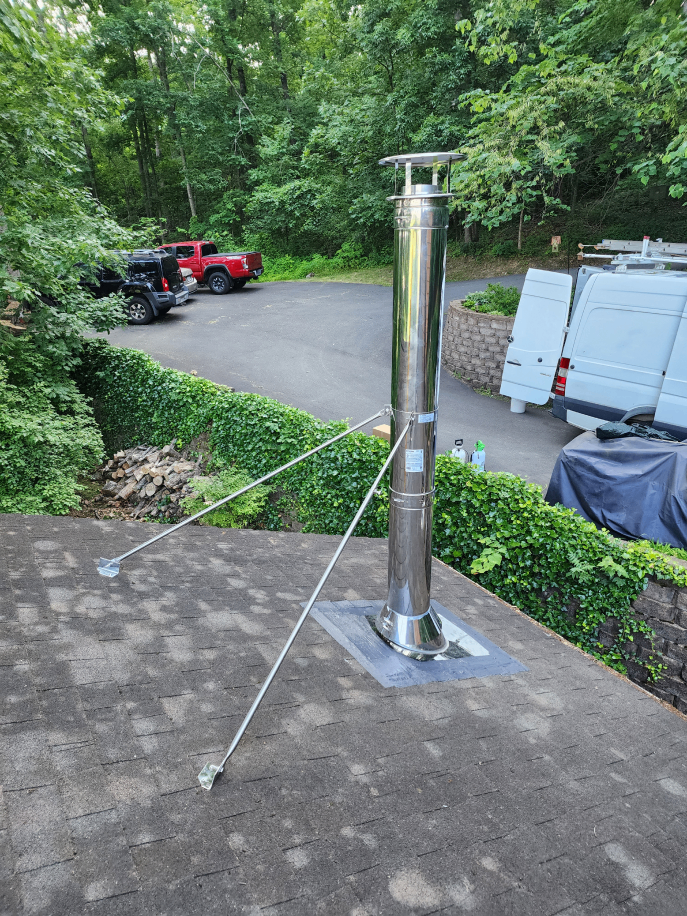For Metal Chimney Pipe Installation Near You, Trust The Chimney Guys in Charlottesville, VA
Some fireplaces, stoves, and furnaces require a high-quality metal chimney pipe to safely vent out flue gases. We specialize in helping homeowners choose and maintain the right chimney venting system for their homes. Whether you’re looking for a Class A chimney pipe for a wood-burning appliance or a B-vent for your gas fireplace, we’ve got you covered. Reach out now.


What Is a Metal Chimney Pipe?
A metal chimney pipe is a prefabricated chimney liner system designed to safely exhaust combustion gases from fireplaces, stoves, and other heating appliances.
Unlike traditional brick-and-mortar chimneys, metal chimney pipes are lightweight, easy to install, and highly efficient at directing smoke and gases outside your home. They are commonly made from stainless steel or galvanized steel and are available in different configurations depending on the type of heating appliance they serve.
What Is a Class A Chimney Pipe?
Class A chimney pipes, also known as double-wall or triple-wall chimney pipes, are designed for high-temperature exhaust systems – such as wood stoves, fireplaces, and pellet stoves. These pipes are built with insulation layers to keep the exterior cool while maintaining a high internal temperature for efficient venting.
The main benefits of class A chimney pipes include:
- They’re built to withstand extreme temperatures from wood-burning appliances.
- They’re versatile and can be used for new constructions or as a replacement for masonry chimneys.
- Their insulated design reduces the risk of heat transfer to surrounding materials.
If you have a wood-burning stove, a pellet stove, or any solid-fuel appliance, you’ll need a Class-A chimney pipe for proper venting. These pipes are also required when extending or modifying an existing chimney system.
What Is a B-Vent Chimney Pipe?
B-vent, or natural vent, chimney pipes are designed for gas-burning appliances – such as fireplaces, furnaces, and water heaters. Unlike Class A pipes, B-vent pipes use a double-wall construction with an air gap for insulation, rather than a solid insulating material.
The main benefits of B-vent chimney pipes include:
- They’re typically more affordable upfront than Class-A chimney systems.
- They’re lighter and simple to install in homes with gas appliances.
- They use natural convection to aid in venting combustion gases.
B-vent pipes are ideal for homeowners with gas fireplaces, furnaces, or water heaters that require venting through the roof. However, they are not suitable for wood-burning or high-temperature appliances.
What Is the Difference Between Single-Wall and Double-Wall Chimney Pipes?
The main difference between single-wall and double-wall chimney pipes lies in their construction, insulation, and how they handle heat and clearances.
Single-wall chimney pipes:
- are made of a single layer of stainless or galvanized steel.
- transfer more heat to the surrounding area.
- require more clearance from combustible materials (typically at least 18 inches).
- generally cost less than double-wall pipes.
- are best for connecting a stove or appliance to the chimney.
- are not suitable for venting through walls or roofs.
Double-wall chimney pipes:
- are made of two layers of metal with an insulating layer (either air or ceramic fiber) between them.
- keep their outer layer cooler while maintaining high flue temperatures for better draft.
- require less clearance from combustibles (sometimes as little as 6 inches, depending on the manufacturer).
- are more expensive due to added insulation and materials.
- are best for safely venting through walls, ceilings, or roofs.
How Often Should I Have My Metal Chimney Pipe Inspected?
Like with any chimney or venting system, you should have your metal chimney pipe inspected at least once a year, per the recommendations of the Chimney Safety Institute of America (CSIA) and National Fire Protection Association (NFPA). Regular inspections help ensure your chimney is in good working condition and free from dangerous buildup or damage.
That said, more frequent inspections may be needed if you use your stove or fireplace multiple times per week, if you burn a lot of softwood or wet wood, or if you are noticing performance issues (think smoke backing up, poor draft, or unusual odors). If you think an addition inspection may be in order, don’t wait to reach out.
We’re Your Trusted Charlottesville, VA Chimney Company
Whether you need a new chimney pipe installed or replaced, or just need to book some routine fireplace maintenance, The Chimney Guys are here to help. Our team of certified professionals ensures your chimney system is up to code, and running as safely and efficiently as possible.
Contact us today to schedule an inspection or consultation.
We offer a lot of fireplace repair specialities, including historical chimney repair services – ask what we can do for you.
